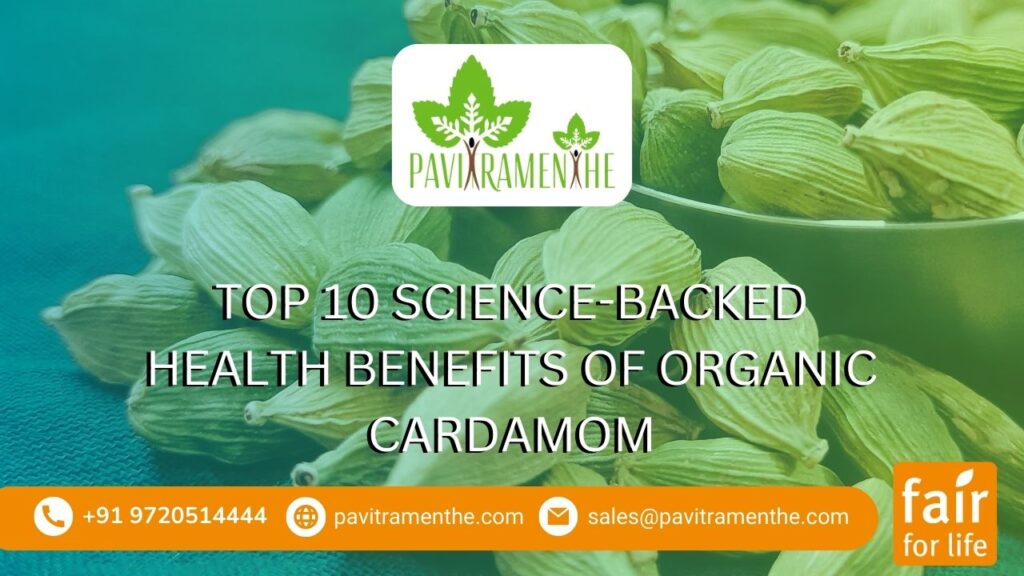This fragrant spice native to the Indian subcontinent, has been used for centuries not only for its culinary value but also for its numerous health benefits. In recent times, the growing popularity of organic products has brought organic cardamom into the limelight. it is cultivated without the use of synthetic chemicals, pesticides, and genetically modified organisms, making it a healthier and more environmentally friendly option. In this article, we will explore the top 10 science-backed health benefits of organic cardamom, providing you with valuable insights into why this spice should be a staple in your kitchen and your daily life.
Powerful Antioxidant Properties:
it is a rich in antioxidants, including flavonoids, phenolic compounds, and terpenoids. These antioxidants help neutralize harmful free radicals in the body, reducing oxidative stress and lowering the risk of chronic diseases such as cancer, cardiovascular ailments, and neurodegenerative disorders.
Also Read: Five Ways Pesticides are harming your health
1. Digestive Aid: one of the most well-known benefits of this is its digestive properties. The spice contains essential oils like cineol and terpene, which aid in relieving indigestion, bloating, and gas. Cardamom can also promote better gut health by stimulating the secretion of digestive enzymes.
2.Oral Health Enhancer:The antimicrobial properties of organic cardamom make it an excellent natural remedy for promoting oral health. It can help fight bacteria responsible for bad breath and gum infections. Chewing on cardamom seeds or using cardamom-infused mouthwash can contribute to healthier teeth and gums.
3.Blood Pressure Regulation:Studies have suggested that organic cardamom may help regulate blood pressure levels. Its active compounds have shown potential in reducing hypertension by dilating blood vessels and improving blood flow. However, individuals with existing medical conditions should consult their healthcare provider before using cardamom as a remedy.
4.Anti-Inflammatory Effects:Organic cardamom contains compounds like limonene and cineole, which possess anti-inflammatory properties. Regular consumption of cardamom can help in managing inflammation-related issues such as arthritis, muscle pain, and swelling.
5.Blood Sugar Management:Research indicates that organic cardamom may help manage blood sugar levels. Some studies have shown that cardamom supplements can improve insulin sensitivity, leading to better blood sugar control. Nevertheless, diabetic patients should seek medical advice before using cardamom as a supplement.
6.Respiratory Health Booster:In traditional medicine, cardamom has been used as a remedy for respiratory conditions like asthma and bronchitis. The spice’s expectorant properties can help alleviate congestion, clear mucus, and improve breathing.
7. Stress Relief and Mood Enhancement:The pleasant aroma of organic cardamom itself can have a calming effect on the mind. Moreover, the spice contains natural compounds that act as mood enhancers. Incorporating cardamom into your daily routine may help reduce stress, anxiety, and promote overall well-being.
8.Weight Loss Aid:Cardamom can aid in weight loss due to its thermogenic properties, which may boost metabolism and help burn fat. Additionally, the spice’s ability to improve digestion can indirectly support weight management efforts.
9.Detoxification Support:it can contribute to detoxifying the body by stimulating kidney function and promoting the elimination of waste products. Its diuretic properties may help flush out toxins and excess water from the system.


The Nutritional Profile of Organic Cardamom
It is commonly used in various culinary dishes, desserts, and beverages.Cardamom has been used in traditional medicine for various purposes, and some studies suggest that it may offer several potential health benefits, though more research is needed to confirm these effects. Some possible health benefits of cardamom include:
Culinary Uses: it is a versatile spice used in various cuisines around the world. It is a key ingredient in Indian masala chai, Middle Eastern coffee, Scandinavian baked goods, and many Indian, Middle Eastern, and Asian savory dishes. The spice is used both in the ground and whole pod form.
Organic Cardamom vs. Conventional Cardamom: Which is Better
cardamom, a highly prized spice known for its aromatic flavor and numerous health benefits, has been cultivated and traded for centuries. In recent years, the rising awareness of environmental and health concerns has led to increased interest in organic products. This includes organic cardamom, which is grown without synthetic fertilizers, pesticides, or genetically modified organisms. In this article, we will delve into the differences between organic and conventional cardamom, examining their impact on health, the environment, and socioeconomics to determine which option is better.
Health Impact of Organic Cardamom:it is cultivated using natural and sustainable methods, without the use of harmful chemicals. As a result, the spice is likely to have fewer chemical residues, making it a safer choice for consumption. Organic farming practices also tend to preserve the soil’s natural fertility, potentially leading to higher nutrient content in the cardamom.
Conventional Cardamom:it is cultivated using synthetic fertilizers and pesticides, which can leave traces of harmful chemicals on the spice. Prolonged exposure to these chemicals may pose health risks to consumers, especially for those with chemical sensitivities or compromised immune systems.
Organic Cardamom: Organic farming promotes biodiversity by avoiding the use of synthetic chemicals that can harm beneficial insects, birds, and soil microorganisms. Additionally, organic practices typically involve the use of compost and natural fertilizers, which improve soil health and reduce the risk of water pollution. By eschewing genetically modified organisms, organic cardamom cultivation also helps maintain the genetic diversity of cardamom species.
Conventional Cardamom:Conventional cardamom farming, on the other hand, heavily relies on synthetic fertilizers and pesticides. The excessive use of these chemicals can lead to soil degradation, water contamination, and damage to non-target species. Moreover, the potential use of genetically modified cardamom strains may pose unforeseen risks to both the environment and human health.
Verdict: it is more environmentally friendly and supports sustainable agricultural practices, making it a better choice for eco-conscious consumers.
Socioeconomic Impact: Organic farming practices often involve fair trade principles, ensuring that farmers receive better compensation for their efforts. By promoting ethical practices, organic cardamom helps improve the livelihoods of farmers, enhances community development, and encourages sustainable agricultural practices for future generations.
Conventional Cardamom:In conventional cardamom production, the focus is primarily on maximizing yields and profits. This approach can sometimes result in exploitative labor practices and lower income for farmers, especially in regions where regulations and labor protections are insufficient.
Verdict: Organic cardamom contributes to better socioeconomic conditions for farmers and communities, fostering a more sustainable and equitable supply chain.
Conclusion: In this comparative analysis, organic cardamom emerges as the better choice in terms of health, environmental impact, and socioeconomic considerations. By opting for organic cardamom, consumers can enjoy a spice that is free from harmful chemicals, environmentally friendly, and supports fairer practices in the agricultural sector.While organic cardamom may be slightly more expensive due to the labor-intensive and sustainable farming practices, the long-term benefits it offers in terms of health and environmental preservation outweigh the initial cost. Additionally, supporting organic farming encourages more sustainable agricultural practices that benefit not only our health but also the well-being of farmers and the planet as a whole.As consumers, it is essential to be mindful of the choices we make and their impact on our health, the environment, and society. By choosing organic cardamom over conventional alternatives, we can contribute to a healthier, greener, and more equitable world.

